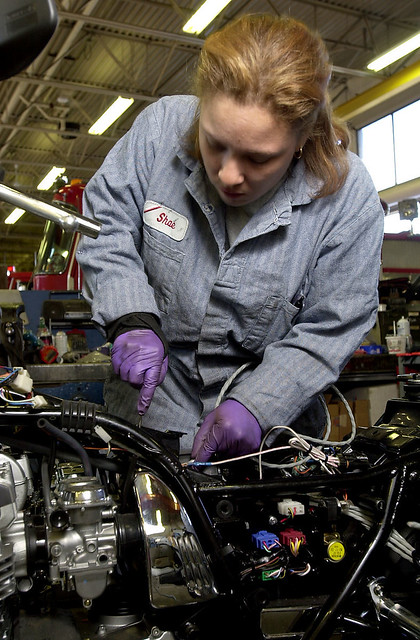There are many roles to play as a process facilitator or as the leader of a meeting. I have a framework of eight roles that I teach: Party Host, Race Car Driver, Mechanic, Nurse, Trip Leader, Improv Comedian, Designer, and Rugby Referee.
In this post I want to highlight the role of the:
Mechanic
Listening for patterns, being alert for what is at odds or in discord; diagnosing underlying issues based on observations.

“What do you expect me to do, diagnose the car trouble over the phone?” My dad grumbled.
“Well… yes!” My mom fired back cheerily.
I’m sure my dad thought that mom had been listening to too much Car Talk. Click and Clack were legends in our household, we even had the CDs. If you’ve never heard of the public radio show, Click and Clack were brothers who were mechanics and they would take calls from listeners with car troubles, diagnosing every sputter or squeal without ever getting their eyes or hands on the car.
I guess my dad didn’t have anything pressing to do, so he decided to take a stab at it. “Hold the phone over the engine.” Next thing you know, we were back on the road and headed home with an even greater respect for my dad’s amazing mechanical abilities.
Not mechanically skilled myself, one of the things I admire about mechanics, is their ability to listen and observe. Whether it is the old school version of listening to the sounds of the engine as the key turns in the ignition or the new school diagnostic tools of reviewing the reading from the engine control module, mechanics use their senses and the data available to them to look for patterns and diagnose problems. They understand how the machine sounds when everything is running smoothly and are able to pick up on anything that is amiss. They are also not afraid to get their hands dirty in the pursuit of answers.
As a facilitator, you also need to be able to observe closely and watch for the signs that something is amiss. Good listening skills are essential as you pick up on not only the language that the participants use to describe their situation, but also the tone and tenor of the conversation. One benefit groups have when they hire an outside facilitator is that the facilitator has an outsider perspective from which to observe patterns of behavior and group dynamics. Figuring out how to listen carefully, observe with all your senses, and turn that data into a diagnosis is how you bring value to a group as a facilitator.
Here are some practical ideas you can get from the Mechanic for your next meeting:
- Practice your listening and observation skills. – My mom and I used to love to sit at the airport and make up stories about the people we saw greeting their friends and family. Become a student of human behavior. Take notes on what you see, hear, and even what you feel (energy and emotions that come up). Noticing is the first step.
- Be comfortable with silence. – In order to listen, you have to allow space for others to speak. You often learn the most in a meeting when there is silence. Hold back from filling the silence just to lessen the awkwardness. If you are tempted to jump in, count to seven before you speak. Most people will speak up within seven seconds of silence, and your patience may allow for someone to have the courage to speak when they otherwise would not have. Notice who speaks up after silence and how they are responded to by the group.
- How will you collect data? – If you are facilitating the meeting, you may not be able to take notes about the group’s behavior. It is very helpful to have an assistant if you are facilitating a group of larger than six.
For more in this series, see what a facilitator can learn from a:
Get the toolkit!
Do you lead meetings? I have put together this free toolkit to help you energize your team through more productive staff meetings. Enter your name and email and click get the toolkit to have it delivered to your email as a PDF.

